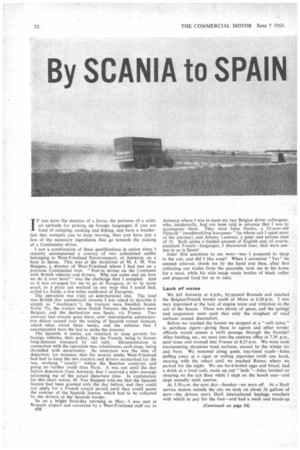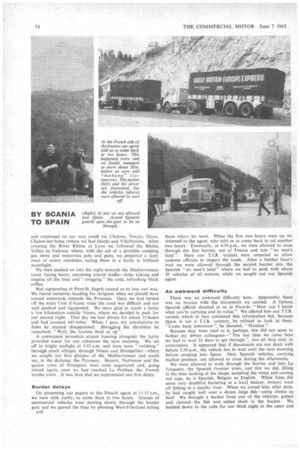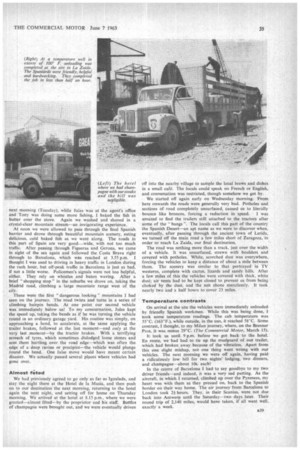By SCAN IA to SPAIN
Page 54

Page 56

Page 57

If you've noticed an error in this article please click here to report it so we can fix it.
IF you have the stamina of a horse, the patience of a saint, an aptitude for picking up foreign languages; if you are fond of camping, cooking and fishing, and have a wanderlust that compels you to keep moving, then you have just a few of the necessary ingredients that go towards the making of a Continental driver.
I saw a combination of these qualifications in action when I recently accompanied a convoy of •two articulated outfits belonging to West-Friesland Eurotransport, of Antwerp, on a haul to Spain, This was at the invitation of M. J. M. Van Stappen, a director of West-Friesland whom I had met on a previous Continental visit. "You've-driven on the Continent with British vehicles and drivers. Why not come and see how we do it over here? " was the challenge that I accepted. And so it was arranged for me to go to Zaragoza, or to be more exact, to a place not marked on any map that I could find, called La Zaida, a few miles south-east of Zaragoza. The operation was truly an international one. The load was British (for commercial reasons I was asked to describe it simply as "machinery "), the tractors were Swedish Scania Vabis 75s, the trailers were Dutch Netams, the hauliers were Belgian, and the destination was Spain, via France. Two convoys had already gone there, after interminable administrative delays caused over the issuing of Spanish transit licences, which takes about three weeks, and the vehicles that I accompanied were the last to make the journey. The Spanish, it seems, are reluctant to issue permits for foreign vehicles, their policy, like the French, being to favour long-distance transport by rail only. Documentation in connection with the operation was voluminous, each stage, being shrouded with uncertainty.So uncertain was the date of departure, for instance, that for several weeks West-Friesland had had to keep the two tractors and drivers earmarked for the run. working " locally " within the Benelux countries and going no further south than Paris. It was not until the day before departure from Antwerp, that I received a telex message informing me of the actual departure time. In explanation for this short notice, M. Van Stappen told me that the Spanish licence had been granted only the day before, and they could not apply for a French transit permit until they could quote the number of the Spanish licence, which had to be collected by the drivers at the Spanish border.
So on a bright Saturday morning in May—I was met at Brussels airport and conveyed by a West-Friesland staff car to a36
Antwerp where I was to meet my two Belgian driver colleagues, who, incidentally, had not been told in advance that I was to accompany them. They were Jules Dockx, a 52-year-old Flemish " swashbuckling buccaneer" (in whose cab I spent most of the journey), and Antony Lauwers, a quiet and serious man" of 35. Both spoke a limited amount of English and, of course, excellent French—languages, I discovered later, that were useless to us in Spain! Jules' first questions to me were—was I prepared to sleep in the cab, and did I like soup? When I answered " Yes " he seemed relieved, shook me by the hand and then, after first collecting our trailer from the quayside, took me to his home for a meal, while his wife made ready bottles of black coffee and prepared food for us to take.
Lack of noise We left Antwerp at 4 p.m., by-passed Brussels and reached the Belgian/French border south of Mons at 6.20 p.m. I was very impressed at the lack of engine noise and vibration in the cab of the Scania. There was plenty of space, and the springs and suspension were such that only the" roughest of road surfaces caused discomfort.
Before we reached the border we stopped at a "café tabac " to purchase cigars—giving these to agents and other border officials would ensure a swift passage through the frontier! After fuelling, etc., we went into the customs office at 7.30 p.m., paid taxes and crossed into France at 8.25 p.m. We were soon encountering atrocious road surfaces, caused by the winter ice and frost. We motored along quiet, tree-lined roads—Jules puffing away at a cigar or rolling cigarettes (with one hand, steering with the other) until we reached Reims, where we parked for the night. We ate hard-boiled eggs and bread, had a drink at a local café, made up our "beds "—Jules insisted an sleeping on the cab floor while I slept on the bench seat—and slept soundly until sunrise.
At 5.30 a.m. the next day—Sunday—we were off. At a Shell service station outside the city we took on about 56 gallons of derv—the drivers carry Shell international haulage vouchers with which to pay for the fuel—and had a wash and brush-up
and continued on our way south via Chalons. Troyes, Dijon, Chalon-sur-Seine (where we had lunch) and Villefranche. After crossing the River Rhone at Lyon we followed the Rhone Valley to Valence, where, with the aid of a portable camping gas stove and numerous pots and pans, we prepared a tasty meal of onion omelettes, eating them in a layby in brilliant moonlight.
We then pushed on into the night towards the Mediterranean coast, facing heavy oncoming tourist traffic—Jules talking and singing all the time and " swigging " the cold, refreshing black coffee.
Bad signposting at Pont-St. Esprit caused us to lose our way. We found ourselves heading for Avignon when we should have turned westwards towards the Pyrenees. Once we had turned off the main Cote d'Azure route the road was difficult and not well marked and signposted. We were glad to reach a layby a few kilometres outside Nimes, where we decided to park for our second night. That day we had driven for about 15 hours and had covered 445 miles. When I gave my calculations to Jules he seemed disappointed. Shrugging his shoulders he remarked: "Well, the tourists held us up ".
A convenient mountain stream running alongside the layby provided water for our ablutions the next morning. We set off in bright sunlight at 5.55 a.m, and were soon " swishing " through small village, through Nimes and Montpellier—where we caught our first glimpse of the Mediterranean and could sec, in the distance, the Pyrenees. Beziers, Narbonne and the quaint town of Perpignan were soon negotiated and, going inland again, soon we had reached Le Perthus, the French border town. It was here that we experienced our first delay.
Border delays On presenting our papers to the French agent at 11.15 a.m., we were told, curtly, to come back in two hours. Queues of commercial vehicles were moving slowly through the border gate and we passed the time by phoning West-Friesland telling B38
them where we were. When the first two hours were up we returned to the agent, who told us to come back in yet another two hours. Eventually, at 4.50 p.m., we were allowed to cross through the first barrier, out of France and into "no man's land". Here our T.I.R. trailers were unsealed to allow customs officials to inspect the loads. After a further hour's wait we were allowed through the second barrier into the Spanish "no man's land" where we had to park with about 30 vehicles of all nations, while we sought out our Spanish agent.
An awkward difficulty There was an awkward difficulty here. Apparently there was no invoice with the documents we carried. A furious Spanish official shouted at us in French: "How can I know what you're carrying and its value." We offered him our T.I.R. carnets which in fact contained this information but, because Spain is not a T.I.R. country, he refused to look at them. "Come back tomorrow ", he shouted, " Matfana".
Because they were used to it, perhaps, this did not seem to bother my driver colleagues—" The last time we came here we had to wait 2+ days to get through ", was all they said, in consolation. It appeared that if documents are not dealt with before 2.30 p.m., the vehicle has to wait until the next morning before crossing into Spain. Only Spanish vehicles, carrying market produce, are allowed to cross during the afternoons.
We were allowed to walk through the barrier and into La Junquera, the Spanish frontier town, and this we did, filling in the time looking at the shops, sampling the wines and cursing red tape, be it Spanish, Belgian or English. While Jules did some very doubtful bartering in a local bazaar, Antony went off fishing in a nearby river. When we joined him, after dark, he had caught well over a dozen large fish—using cheese as bait! We brought a bucket from one of the vehicles, gutted and cleaned the fish and salted them in the bucket. We bedded down in the cabs for our third night in the open and next morning (Tuesday), while Jules was at the agent's office and Tony was doing some more fishing, I baked the fish in butter over the stove. Again we washed and shaved in a crystal-clear mountain stream—an invigorating experience.
At noon we were allowed to pass through the final Spanish barrier and drove through beautiful mountain scenery, eating delicious, cold baked fish as we went along. The roads in this part of Spain are very good—wide, with not too much traffic. After passing through Figueras and Gerona, we came in sight of the sea again and followed the Costa Brava right through to Barcelona, which was reached at 3.55 p.m. I thought I was used to driving in heavy traffic in London during the rush hour, but off-peak traffic in Barcelona is just as bad, if not a little worse. Policemen's signals were not too helpful, either. They rely on whistles and baton waving. After a brief "shopping stop" in the suburbs we drove on, taking the Madrid road, climbing a large mountain range west of the city.
These were the first "dangerous looking" mountains I had seen on the journey. The road twists and turns in a series of climbing hairpin bends. At one point our second vehicle was immediately below us! To my consternation, Jules kept the speed up, taking the bends as if he was turning the vehicle round in an ordinary garage yard. His routine was simply, on approaching a bend, to accelerate, at the same applying the trailer brakes, followed at the last moment—and only at the very last moment—by the tractor brakes. With a terrifying' screech of tyres, which sometimes dislodged loose stones and sent them hurtling over the road edge—which was often the edge of a deep ravine or precipice—the vehicle would plunge round the bend. One false move would have meant certain disaster. We actually passed several places where vehicles had gone over,
Almost feted
We had previously agreed to go only as far as Tgualada, and stay the night there at the Hotel de la Masia, and then push on to our destination the next morning, returning to the hotel again the next night, and setting off for home on Thursday morning. We arrived at the hotel at 8.15 p.m., where we were greeted—almost feted—by the proprietor and his staff. Bottles of champagne were brought out, and we were eventually driven off into the nearby village to sample the local brews and dishes in a small cafe. The locals could speak no French or English, and conversation was restricted, though somehow we got by.
We started off again early on Wednesday morning. From here onwards the roads were generally very bad. Potholes and sections of road completely =surfaced, caused us to literally
bounce like broncos, forcing a reduction in speed. I was amazed to find the trailers still attached to the tractors after some of the bangs '*. The locals call this part of the country the Spanish Desert—an apt name as we were to discover when. eventually, after passing through the ancient town of Lerida, we turned off the main road a few miles short of Zaragoza, in order to reach La Zaida, our final destination.
The road was nothing more than a track, just over the width of a vehicle. It was =surfaced, strewn with boulders and covered with potholes. White, scorched dust was everywhere, forcing the vehicles to keep a distance of about a mile between them. The scenery was similar to that portrayed in TV westerns, complete with cactus, lizards and sandy hills. After a few miles of this the vehicles were covered with thick, white dust; air vents had to be kept closed to prevent us from being choked by the dust, and the sun shone mercilessly. It took nearly two and a half hours to cover 23 miles.
Temperature contrasts
On arrival at the site the vehicles were immediately unloaded by friendly Spanish workmen. While this was being done. I took some temperature readings. The cab temperature was 55°C. (163°F.), while outside, in the sun, it reached 58°C. Some contrast, I thought, to my Milan journey, where, cm the Brenner Pass, it was minus 29°C. (The Commercial Motor, March 15).
It took us until 9 p.m. before we got back to the hotel. En route, we had had to tie up the mudguard of our trailer, which had broken away because of the vibration. Apart from this one slight mishap, not one thing went wrong with our vehicles. The next morning we were off again, having paid a ridiculously low bill for two nights' lodging, two dinners, and champagne—about 10s. each!
In the centre of Barcelona I had to say goodbye to my two driver friends—and indeed, it was a very sad parting. As the aircraft, in which I returned, climbed up over the Pyrenees, my heart was with them as they pressed on, back to the Spanish border on their way home. The air journey from Barcelona to London took 21 hours. They, in their Scanias, were not due back into Antwerp until the Saturday—two days later. Their round trip of 2,140 miles, would have taken, if all went well, exactly a week.




































































































